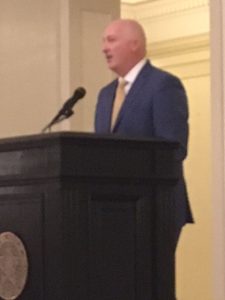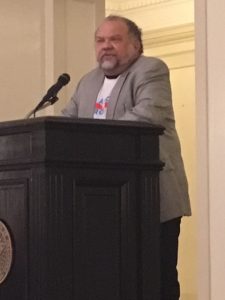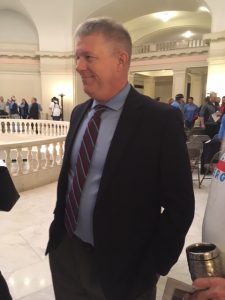
The message was loud and clear Tuesday at the State Capitol where oil and gas industry people gathered for a “Rally for the Rigs” event. The rally was sponsored by the Oklahoma Oil and Gas Association and the Oklahoma Independent Petroleum Association.
“We have done our part. Then last night, we were asked to do even more.”
That’s the comment of Chad Warmington, President of the Oklahoma Oil and Gas Association in response to the State House passage Monday night of a $447 million education tax hike that includes boosting the state’s gross production tax to 5%.
He and other speakers rallied about 250 industry workers who came to lobby their legislators to vote against the bill that would give teachers a pay raise of $7,700.
“The House of Representatives passed the largest tax increase in years and much of it is on the oil and gas industry,” said Warmington, the first of 5 to speak to those on hand. “The last three sessions alone, the oil and gas industry has contributed more than $410 million in new taxes.”

Devon Energy executive Wade Hutchings, chairman of OKOGA told the crowd his association is very much supportive of an effective education system as well as a pay raise for teachers.
“But I’ll just be very clear here. We will not back down from a very clear position that any increase in taxes on new wells drilled in Oklahoma will ultimately result in a loss of wells being drilled. That principle is iron clad with us.”
OKOGA had expressed support to the Step Up Oklahoma plan which called for a 4% GPT. But Hutchings, Senior Vice President at Devon Energy, said every other plan since would not be supported by his group.
“So we will continue to be opposed to them.”
Hutchings wanted those lobbying the legislators to make it clear that one in 5 jobs in the state is associated directly and indirectly to the oil and gas industry. He said the industry pays 22% of all the taxes in the state.
The Devon Energy executive had a stern warning for the legislature about raising the GPT to 5%. He said it would raise Oklahoma’s tax standing of 8th out of the 16 largest oil and gas producing states.
“We have moved up to 5th. If we move to a 5 or even a 7 percent GPT, we will essentially be second or third highest oil and gas taxed state in the nation. Clearly we would be moving in the opposite direction if we want to incentivize more economic development in the state,” said Hutchings.
He also predicted a higher gross production tax will result in fewer wells drilled in Oklahoma.
“The very best wells will continue to get drilled. What is in question when you see increasing costs or tax burdens on our industry is the wells on the margin,” said Hutchings. “If our tax burden is higher, those wells will simply not get drilled.”
He said Devon Energy instead would resort to drilling wells in more productive areas with less of a tax burden such as in Texas and North Dakota.

Hutchings was joined by OIPA member Darrell Noblitt of Tulsa-based Armor Energy who said the state had become too dependent on the oil and gas industry.
“We are not the state’s rich uncle and their ATM,” he told the crowd.

Rep. Kevin Calvey wrapped up the speeches by telling the crowd he debated and voted no “on that monstrous job-killing tax bill.”
He said the bill needed to be killed in the senate.
“It’s time that politicians quit imposing their will on the people by raising taxes—job-killing taxes. It’s time politicians quit looking at you all as their ATM machine for wasteful spending like we’ve seen at the State Health Department,” said Calvey.
Similar arguments might be heard Wednesday when the annual Wind Lobbying day at the capitol is held. Like those in the oil and gas industry, the wind farm operators are fighting efforts to put caps on refunding unused tax credits. They have accused legislators of retroactively taking action on agreements made years ago.
One spokesman has warned it could lead to lawsuits and the failure of some wind projects.





